- Home
- Aaron J. French
Songs_of_the_Satyrs Page 10
Songs_of_the_Satyrs Read online
Page 10
A white-haired man with bright blue eyes and a ruddy face regarded him. He wore a black frock coat and a wine-stained shirt.
“Lord Paige, I assume. My name is Morlington. Someone has informed me that you are thinking of selling your estate. I have come here to make inquiries.”
“You speak English like an American,” he said, his voice a gruff guffaw.
“I divide my time between Hull and London,” Varinius said, improvising a story. “Thus the confusion of dialect.”
“Come in,” he said, turning abruptly and gesturing.
Varinius followed him inside. Paige glanced back.
“Crooked legs,” he observed, a stifled laugh bursting from his lips.
“I have an infirmity—from birth.”
Lord Paige only laughed again.
The house, though its interior and furnishings were magnificent, was covered with dust. A musty smell radiated from the carpets. Empty liquor bottles crowded the top of every table, the piano and piano bench, and several stairs on the staircase. Paige ambled on. Then he turned and, as if from nowhere, flourished a sword at Varinius. He tossed another sword to him.
“En garde,” he said, his eyes alive with mad glee.
Varinius recovered from his astonishment quickly enough to catch the blade and duck a swipe by Paige that might have taken his head off. The old man laughed wildly. Varinius did not know how to fight with a sword. He had watched the Roman legionaries train in the ancient days. Their blades were different, though, and he had never done more than observe them from afar.
The old man, drunk and half mad, wore a look of bloodlust on his face. “Let’s see how well you can fence with those gamey legs,” he spewed, thrusting his thin sword.
Varinius parried, turned, and thrust back, surprising the old man, who gaped at him a moment and then went after him with renewed vigor and more focus. Varinius dodged his jabs and feints. Lord Paige was skilled, no doubt, but his inebriation and the damage he had done to himself through dissolute living blunted his ability.
With the adroitness of a half animal, Varinius quickly saw patterns in his opponent’s attack. He watched him (he was slowing down from fatigue), saw the right moment, rushed at him, parried, and knocked the sword from his grip, sending it high into the air.
He stepped back, caught the airborne sword and backed Lord Paige into a corner, both points sticking an inch from his throat. They faced off in silence.
“You see,” Varinius said into the astonished eyes of the drunk old man, “I have worked very hard to overcome my handicap.”
He paid twice as much as he should have for the estate. But he paid in gold, which Paige could not gainsay. He closed the estate to hunting so the old groves and woodlands that had once been his realm could recover their vitality through natural processes. He refitted and repaired the house, hired servants and gardeners, a cook and a valet. In a few months the place had recaptured its former glory.
Ionia had inherited Miss Mannering’s estate. Neighbors grumbled that a “sapphic,” as they termed her, had gotten all the old woman’s land and money, but Mannering’s lawyers had made the will airtight. She surprised everyone by courting (and, for effect, sleeping with) men and by being seen in London and Paris with Varinius at her side. She spent a year in Paris to have his child (a girl—dryads only bore female children).
She came back with Nerina, whom she introduced as her orphaned cousin. Everyone knew Nerina was more directly related than a cousin, but the practice of a short sojourn overseas and convenient lies afterward was common among landed female gentry who bore unexpected children, and they accepted her.
She helped Varinius adapt to the patterns of human life. She advised him (he had not thought of this) to appear to age, to announce his death, and then appear as a young son. The high-ranking gods could shape-shift easily and assume any form; lower-ranking deities possessed less spacious powers in this regard, but with practice he learned to appear older and then younger.
From his purchase of Paige House in 1710 to his current ownership now in 1880, he had portrayed four different men. Soon it would be time for number five. Ionia kept her supernatural existence hidden by a similar ruse.
They were still lovers. She seemed content with him. He ranged over a wide territory with women, but she understood and accepted as much. He was, after all, a satyr. In another thirty years, she would once again be ripe for childbearing.
***
He made a pleasurable visit to her and then rode back home. His first guests from London would arrive in a few hours. Until that time, he would have the young bareback riders, Annabella and Cynthia, perform their famous “dance” for him (he had never seen it, but it was all the rage among the men of London). Then he would take them to his darkened chamber, where they could not see his goatish legs and tail, and decide if they were worth their price.
Ship of Fools
By David Farland
Snow-laden pines huddled beneath their white burdens at the margin of the road, and for a moment the Ship of Fools halted as it crested a hill. Its hull was painted a merry yellow. A bitter breeze played in sails of red silk. The wooden figurehead, a fool dressed in motley, wore a comic frown, as if afraid he might run aground. From a distance, the ship would have seemed to be sailing backward through the snow.
“Whoa,” Erstwhyle called to the gray draught horses that pulled the ship. The vessel had been hoisted up on axles and turned into a wagon. Every time it rolled through a town, rustics would gape and point. Inns and homes would empty as spectators gawked. Erstwhyle liked that. The bigger the crowd, the more he got paid.
Castle Crydon loomed ahead, perched upon a steep crag. Walls rose up, gray and oppressive, with merlons like rotten teeth. A dozen tall towers rose in great spires, black spears aimed at the heavens. Guards in bright red cuirasses marched along its wall like toy soldiers. No peaceful lord needed such protection.
A wretched city squatted in its shadow. Squalid houses and cheap wooden shops leaned at odd angles, as if wondering where to fall.
’Tis a sin that good trees died to create such a monstrosity, Erstwhyle thought. He liked trees, but preferred them alive and breathing. Houses were not for him. The boughs of a living pine were roof enough.
Gray clouds lowered above the castle, threatening snow. Shadow creatures moved among them, their bat-like wings flapping, slow and deliberate.
“Baron Blunder, lend me use of your eyes,” Erstwhyle begged.
As a satyr, Erstwhyle had the golden eyes of a goat, with a long black horizontal slit for a pupil. He saw well to the side, but could not focus at long distances. He shaded his eyes as he peered above the castle, raising a hand to his brow where his dark horns rose, twisting as they swept back over his head. His nostrils flared, as if to catch some elusive scent in the snow. The land had the steel smell of ice.
Baron Blunder, a fat giant in his forties, raised his head up through the hatch of the ship. His face was as pale as the snow, his jowls as massive as those of a bulldog. Baron Blunder had the look of a lack-wit, but it was all for show.
“There above the castle,” Erstwhyle asked, “over the topmost tower—is there something in the clouds?”
“Dream dragons,” Blunder offered. “Naught but phantasms. Prince Crydon is a pompous git, if the sayings be true.”
“Thought you said he was perverse,” Erstwhyle corrected. “Not pompous.”
“He’s both. It’s an unnatural union. Not unlike yourself.”
Erstwhyle was the last of the satyrs. He didn’t see himself as anything but human, yet every day he was reminded that he was something less.
“I want to see!” Amilee cried from inside the ship. She flung open the side door, her pretty young face so pale and free of blemish it seemed translucent. Her dark brown tresses hinted at flame.
Erstwhyle’s heart skipped. “Stay hidden!” he hissed. But it was too late. She’d already popped her head out, despite the warnings.
No one was near
in the woods, yet at just that instant, a dream dragon dropped below the clouds and glared at them—a monstrous creature ancient and rancid, ragged flesh stripped away from it in tatters, eyes blind and rheumy. It could have been beautiful, a work of art. It was created from nothing more than dreams, after all. But this was not something born from a summer’s fancy, only a monstrosity ripped from a nightmare. A man would have to study evil for long hours to create such a specter.
Its gaze veered toward the Ship of Fools, fixed on Amilee like a rat speared to the floor, and then the dragon lifted back into the clouds.
Could such a monstrosity really see them? Erstwhyle chewed his lip. Probably not, he decided. He was a tough creature, yet right now he felt tiny and helpless.
Crydon was evil. He liked to hunt young women, girls who had been accused of crimes—petty theft, lewd behavior, gossiping. But only the pretty ones. He stripped them naked first. Those who got away lived to tell the tale; those who did not—no one ever learned of their fate.
It wasn’t fair. But when were lords ever fair? And who would dare stand against Crydon?
Need had driven the three here, like a teamster with a sharp whip. Ever since the highwaymen had robbed them last summer, Erstwhyle felt drawn to this place. In a time of war, a jester’s arts were needed more than ever. Yet widows and orphans had no coin to pay for entertainment, and in town markets where he once had earned good gold, he now only earned the gratitude of impoverished folks.
Crydon’s gold had drawn them. Rumor on the road said that he’d pay one thousand guldens this night to the fools that pleased him best.
Now here Erstwhyle was, looking up at Crydon’s castle. Crydon the Huntsman. Crydon Blood-Fist. The Dark Prince.
“Back in the ship, Amilee,” Erstwhyle warned. “Crydon has an unsavory taste for pretty girls.”
***
The Ship of Fools stopped at an inn at the base of the city. A crowd gathered to look, just as the snow began to swirl from the sky in great wet flakes.
Erstwhyle sat on the buckboard and played his lute for the crowd while Baron Blunder bought dinner at the inn. He soon came back with a gangrel of a chicken, along with buttered parsnips, stewed plums, and hard, dark bread. He brought a keg of apple cider, and they retired into the ship to eat.
As they entered the ship, a townsman peered in the doorway. “Ooh, there’s a tasty tart!” he called. Erstwhyle slammed the door shut behind him, shaken.
A dream dragon might not be able to see, but now a villager had seen Amilee. Would he report it? Did the prince pay for news of pretty girls?
Dark was falling fast, so Amilee lit a small lantern made of bloodshot glass.
She ate little, nibbling a roll. Baron Blunder, on the other hand, shoved food down his gullet as fast as possible. All were nervously silent as they considered the evening’s performance.
“You’ll do well,” Amilee predicted. After six weeks of teaching him to sing in the prince’s native Dangolian tongue, she had no more advice to give him. She only stared down at her roll, as if gazing into eternity.
“Sure,” Baron Blunder agreed with a smack of his lips. “He always does well. He’ll win the prince’s purse.”
“Win or lose matters little,” Erstwhyle said. “I’m more worried about you, Amilee.” She was an outlaw, after all.
“My parents fled years ago,” she objected. “He’s forgotten by now.”
She didn’t seem frightened enough. Perhaps it was her youth. She would not say how old she was—thirteen, fourteen—but she was too young to understand the ways of princes. Crydon would never forget a traitor’s family.
Baron Blunder quickly finished eating and said, “Best hurry on, don’t ya think? Castle gates close at dusk.”
“Aye,” Erstwhyle agreed. “Drive us in.”
Blunder grunted and lunged out the ship’s door, then climbed into the driver’s seat. With a click of the tongue he jolted the horses into motion.
As the vessel rattled and rolled, Erstwhyle peered hard at Amilee. She was a quiet girl who seldom showed emotion, and he could not read her now. Her face, lit by the lantern, seemed surreal. In only moments, Baron Blunder tapped the top of the vessel twice. They were nearing a guardhouse.
“Remember,” Erstwhyle said, “there will be soldiers about. The ship can’t be seen pitching or moving. And the guards might try to take a peek inside, so keep hidden. We should be done by third watch, for good or ill.”
“I’ll keep still,” she said.
He worried though. Amilee had a fondness for taking long walks in the darkness to enjoy the light of the moon.
With that she climbed into a trunk that Baron Blunder often used as a stool. The clothes and props that were normally stored there had been shifted elsewhere in the cabin. Amilee folded herself in.
Erstwhyle went to her, held her hand, and peered into her sapphire-blue eyes. Her hand felt cold this winter’s day.
“I love you,” she said. “I wish . . .”
His heart stammered before it caught a beat. She’d never said that she loved him before. He was older than her, nearly twenty. He didn’t quite know what she meant by “love.”
As if to confirm her feelings, she leaned up and kissed him. He felt stunned. Her lips were cold and a chill rushed over him. He felt it a portent.
“I wish I was a satyr.”
Erstwhyle smiled sadly. “Ah, child,” he said. “Be glad that you’re human. There’s no place for my kind in your world.”
He smiled again and pushed her down into the chest. He heard a guard outside call, “Halt!” Baron Blunder mumbled loudly as the ship drew to a stop.
Erstwhyle finished pushing Amilee into the chest and applied a heavy padlock. He climbed atop it and sat, just as guards threw open the door. Curious faces peered in.
“Boo!” Erstwhyle said. The guards’ eyes widened.
Erstwhyle plucked the last flesh from the bones of his chicken, giving the guards a bored stare. They were so shocked, they fell back from the door and slammed it shut.
***
That night the Solstice Feast was already underway as Erstwhyle and Baron Blunder entered the servants’ antechamber. There was no merry hearth in the huge room, only frost creeping over the threshold from outside. There were not even the faded tapestries that one would expect to hold in the heat, only cobwebs adorning the bare stone corners of the hall.
Apparently in Crydon’s realm, servants were treated no better than cattle.
Three hundred bards and fools had gathered for the competition. Fear and anticipation filled the room. He saw it on the faces of black-skinned acrobats from Mansurria dressed in jaguar furs. One pretty young gypsy woman wearing silks was emptying her stomach in a corner, a victim of butterflies.
Performers had traveled hundreds of leagues for a chance at tonight’s reward. Erstwhyle himself had spent weeks on the road and was now penniless and far from home.
He didn’t just want to win; he needed it, ached for it. Erstwhyle was a fair acrobat and could dance with the best of them. As a satyr, he would arouse a sense of wonder and curiosity—if not fear. All of that worked in his favor, making his acts more memorable.
But to win a thousand guldens, he’d need more than spectacle. Singing and the lute were his strongest skills. He had a voice as mellow as honeyed wine, and his throaty vibrato would haunt an audience. Yet for his songs to strike hard, they needed to be sung in the tongue of his audience, as Amilee had taught him.
He hoped she was safe. She was still hidden in the Ship of Fools, parked on a great roundabout at the servants’ entrance. She’d promised to be still, but there were guards strutting about—men with hawkish faces and searching eyes.
Outside, snow was tumbling through night skies. Erstwhyle brushed it from his shoulders and pulled back the hood of his great cloak, exposing his horns. People gasped. All eyes followed him as he entered the castle and doffed the cloak, hanging it on a peg.
He peered through a curtain. His riv
als, the Maidens of Mansurria, sang a haunting tune to shrill pipes, while two beauties danced about the room.
Tough competition. Their beauty was ethereal, their voices sublime. And more than one of them would sleep with the prince for a chance at the reward.
Erstwhyle went to a corner and began to tune his lute when one of Crydon’s lackeys, an aide to the chamberlain, told him brusquely, “You with the horns—you’re next.”
It was always that way. He was a curiosity, and everyone was eager to see him. But he wanted time to study the situation. Winning a competition required an understanding of the lay of the land.
“Wait,” Erstwhyle said. “I need some help, friend.”
The aide, a teen with a pimpled face, drew near. His breath smelled of wine. His mousey hair looked like hay. The boy kindly switched to Taldagean, a tongue common among traders. “Need help with props?”
“I need to know who in the room is out of favor with his majesty.” The teen got a sly look, and Erstwhyle suspected that the boy was about to mislead him. “There’s a pretty tip in it for you if this turns out well.”
“The table farthest from his majesty, a red priest by the name of Typhos. You’ll know him by the scar.” He made a slash across his nose.
Erstwhyle grinned. The table farthest from a lord was often left for those out of favor. To have a victim for his jests—and a red priest at that—was gratifying.
Baron Blunder lumbered across the room with a bundle of juggling pins. The aide pulled back a curtain and the fools entered.
***
Prince Crydon’s feasting hall was enormous. Sconces by the thousands along the walls lit the room. Each was made from a skull, cunningly chiseled so that flickering candles glowed inside. Others were set as footlights for the actors. Flames danced within them like serpents’ tongues.
“Vanquished enemies?” Baron Blunder murmured. But they could not have all been enemies. Yes, there were crystal goblin skulls among them with their sharp canines and the broad skulls of giants out of the Gwaylin Hills. But some among the human skulls were so small they had to have been taken from children.

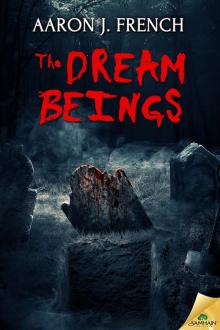 The Dream Beings
The Dream Beings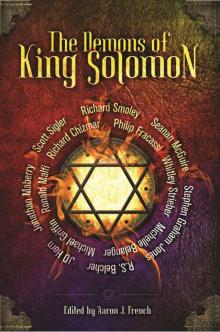 The Demons of King Solomon
The Demons of King Solomon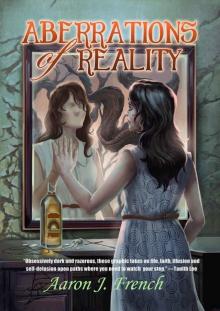 Aberrations of Reality
Aberrations of Reality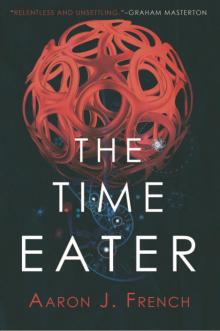 The Time Eater
The Time Eater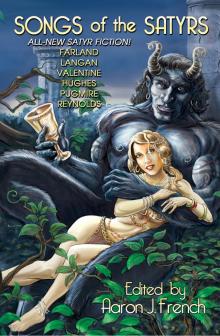 Songs_of_the_Satyrs
Songs_of_the_Satyrs